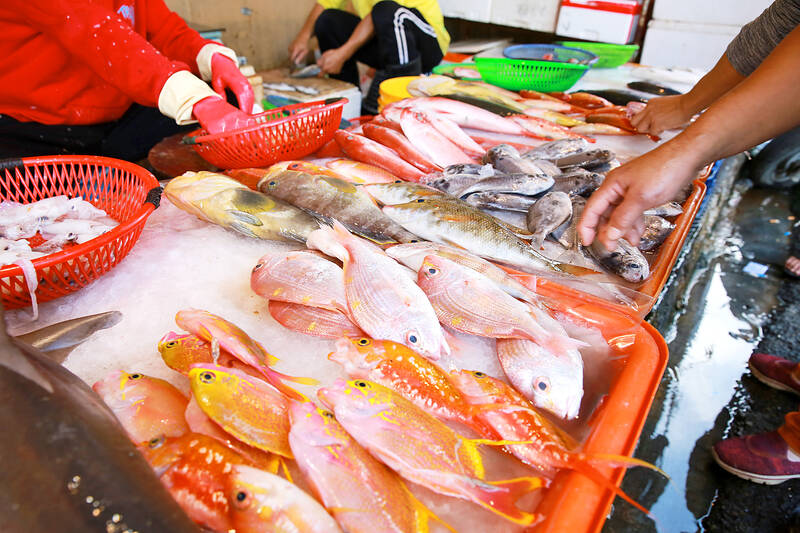Stock of 24 common fish species around Taiwan are declining due to overfishing, while the average size of the fish in catches is shrinking, Greenpeace said on Thursday as it announced the results of its “fish census” at a news conference in Taipei.
The study — which assessed fresh catches at harbors and markets across Taiwan — showed that the nation’s marine resources are in urgent need of protection, Greenpeace said.
Its staff collaborated with National Kaohsiung University of Science and Technology aquaculture researcher Ho Hsuan-ching (何宣慶) to conduct the study, which focused on 40 common fish species as they were offloaded or put on sale, Greenpeace project manager Lee Yu-tong (李于彤) said.

Photo courtesy of Greenpeace Taiwan
The study showed a large decline in the proportion of mature fish in catches, indicating a serious overfishing problem for all 24 species, Lee said.
“Most of the 24 species are fish commonly consumed by Taiwanese, including greater amberjack, dory, Japanese jack mackerel, silver pomfret, red tilefish and black croaker,” she said.
“The study showed that over-fishing has placed a lot of stress on the species so that they are unable to sustain their populations,” she said.
In the long term, Taiwan’s main economic fish stocks would decline and the average fish size would shrink, harming the livelihoods of local communities, she said, adding that “it would be a lose-lose situation for fishers and the marine ecosystem.”
The study was conducted from March last year to January at Donggang (東港) in Pingtung County, Cianjhen (前鎮) and Keziliao (蚵仔寮) in Kaohsiung, Magong (馬公) in Penghu County, and Dashi (大溪) and Nanfangao (南方澳) in Yilan County.
About 30,000 samples were measured, Lee said.
The data showed that for five species — silver pomfret, greater amberjack, black croaker, javelin grunte and silver grunt — more than 90 percent of the fish measured were under their respective lengths at maturity, Ho said.
It was the first widely conducted fish census for Taiwan, he said.
“The results showed a high proportion of immature, small fishes, which is the same issue fishers around the world are facing,” he said. “If we can sound the alarm early, maybe can come up with a strategy to make changes.”
“When fish stocks are depleted, seafood prices will rise,” Ho said. “If we continue with the ways we catch and consume fish, all of the species will be eaten into extinction.”
Shao Kuang-chao (邵廣昭), an honorary fellow at Academia Sinica’s Biodiversity Research Center, said that lawmakers have approved a draft marine conservation act, but it has been delayed for years at the legislature.
The legislation would allow government agencies to plan for and delineate protected marine areas and impose fines of up to NT$500,000 for those who ignore them, Shao said.
There are many ways to conserve marine resources, but setting up protected areas and properly enforcing them is the simplest, most economical and most effective approach, he added.

A magnitude 6.4 earthquake struck off the coast of Hualien County in eastern Taiwan at 7pm yesterday, the Central Weather Administration (CWA) said. The epicenter of the temblor was at sea, about 69.9km south of Hualien County Hall, at a depth of 30.9km, it said. There were no immediate reports of damage resulting from the quake. The earthquake’s intensity, which gauges the actual effect of a temblor, was highest in Taitung County’s Changbin Township (長濱), where it measured 5 on Taiwan’s seven-tier intensity scale. The quake also measured an intensity of 4 in Hualien, Nantou, Chiayi, Yunlin, Changhua and Miaoli counties, as well as

Credit departments of farmers’ and fishers’ associations blocked a total of more than NT$180 million (US$6.01 million) from being lost to scams last year, National Police Agency (NPA) data showed. The Agricultural Finance Agency (AFA) said last week that staff of farmers’ and fishers’ associations’ credit departments are required to implement fraud prevention measures when they serve clients at the counter. They would ask clients about personal financial management activities whenever they suspect there might be a fraud situation, and would immediately report the incident to local authorities, which would send police officers to the site to help, it said. NPA data showed

ENERGY RESILIENCE: Although Alaska is open for investments, Taiwan is sourcing its gas from the Middle East, and the sea routes carry risks, Ho Cheng-hui said US government officials’ high-profile reception of a Taiwanese representative at the Alaska Sustainable Energy Conference indicated the emergence of an Indo-Pacific energy resilience alliance, an academic said. Presidential Office Secretary-General Pan Men-an (潘孟安) attended the conference in Alaska on Thursday last week at the invitation of the US government. Pan visited oil and gas facilities with senior US officials, including US Secretary of the Interior Doug Burgum, US Secretary of Energy Chris Wright, Alaska Governor Mike Dunleavy and US Senator Daniel Sullivan. Pan attending the conference on behalf of President William Lai (賴清德) shows a significant elevation in diplomatic representation,

The Taipei MRT is to begin accepting mobile payment services in the fall, Taipei Rapid Transit Corp said on Saturday. When the company finishes the installation of new payment units at ticketing gates in October, MRT passengers can use credit cards, Apple Pay, Google Pay and Samsung Pay, the operator said. In addition, the MRT would also provide QR payment codes — which would be compatible with Line Pay, Jkopay, iPass Money, PXPay Plus, EasyWallet, iCash Pay, Taiwan Pay and Taishin Pay — to access the railway system. Currently, passengers can access the Taipei MRT by buying a single-journey token or using EasyCard,